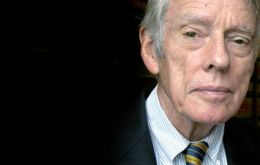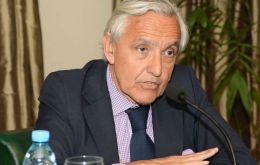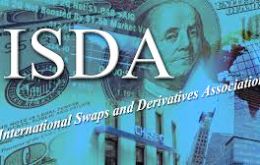MercoPress. South Atlantic News Agency
Tag: Argentina
-
Tuesday, August 5th 2014 - 07:10 UTC
Cristina Fernandez pledges “to adopt the most suitable measures for Argentina”

Argentine President Cristina Fernandez said on Monday that she would only take decisions that benefitted the overall health and stability of the Argentine state, as she called on the country to defend the achievements of the last 10 years.
-
Tuesday, August 5th 2014 - 06:54 UTC
Griesa praises Pollack's 'great skill” and reveals he directed the use of 'default'

U.S. District Judge Thomas Griesa on Monday turned back an effort by Argentina's government to remove the court-appointed mediator in the dispute with creditors that triggered a 'selective default' situation by the country last week. He also revealed that the default condition was at his direction and was 'accurate'.
-
Tuesday, August 5th 2014 - 06:50 UTC
Barcena anticipates that Argentina will probably have negative growth in 2014

Argentina's economy probably will contract in 2014, the head of the United Nation's body for Latin America and the Caribbean, ECLAC said on Monday, as fallout from a new sovereign debt crisis will keep the country out of money markets.
-
Monday, August 4th 2014 - 07:41 UTC
Trying to gauge the impact of Argentina's situation in Mercosur partners

Argentina’s debt problems threatens to worsen trade tensions in Mercosur, adding to the economic woes of Brazil in a tense election year and causing headaches in Uruguay as the Argentine economy looks likely to plunge deeper into recession.
-
Monday, August 4th 2014 - 07:34 UTC
Debt ruling shows a callous disregard to the effects on Argentina

By Eileen Appelbaum (The New York Times) - There is no way to construe as fair the United States court ruling that Argentina cannot pay 93% of its creditors, unless it first pays a small group of hedge funds. It's not fair to the 93% of bondholders who negotiated a restructuring of Argentina’s debt in 2005 and 2010 with reduced payments.
-
Monday, August 4th 2014 - 07:27 UTC
Argentina awarded by the EU beef 'feed-lot quota' of 48.200 tons

The European Union (EU) has recognized Argentina as one of the few countries able to export high-quality beef under the “feed-lot quota” to the European market, a press release from the Argentine Foreign Ministry informed on Sunday.
-
Monday, August 4th 2014 - 07:09 UTC
Malvinas war and the 2001 and 2014 defaults, Argentina's worst mistakes in 33 years

The Falklands/Malvinas war, the 2001 default and the 2014 default are “the three events that are going to go down, in recent Argentina history, as the three worst strategic mistakes committed by the country”, according to political analyst and historian Rosendo Fraga.
-
Sunday, August 3rd 2014 - 13:22 UTC
“Argentina Finds Relentless Foe in Paul Singer’s Hedge Fund”

The following article by Peter Eavis and Alexandra Stevenson was published in The New York Times and addresses the current litigation between Argentina and the speculative funds. The hedge fund firm of billionaire Paul E. Singer has about 300 employees, yet it has managed to force Argentina, a nation of 41 million people, into a position where it now has to contemplate a humbling surrender.
-
Saturday, August 2nd 2014 - 09:18 UTC
“Debt restructuring” and the Argentine case by Joseph Stiglitz

The following piece published in The New York Times was written by Joseph E. Stiglitz, winner of the Nobel Prize in Economics and a former chief economist of the World Bank, and currently a professor at Columbia University.
-
Saturday, August 2nd 2014 - 09:08 UTC
IDSA decides that Argentina “failed to pay” and thus declares it has defaulted

The International Swaps and Derivatives Association (ISDA) on Friday declared Argentina in default, which could trigger payments worth up to one billion dollars on credit default swaps.
